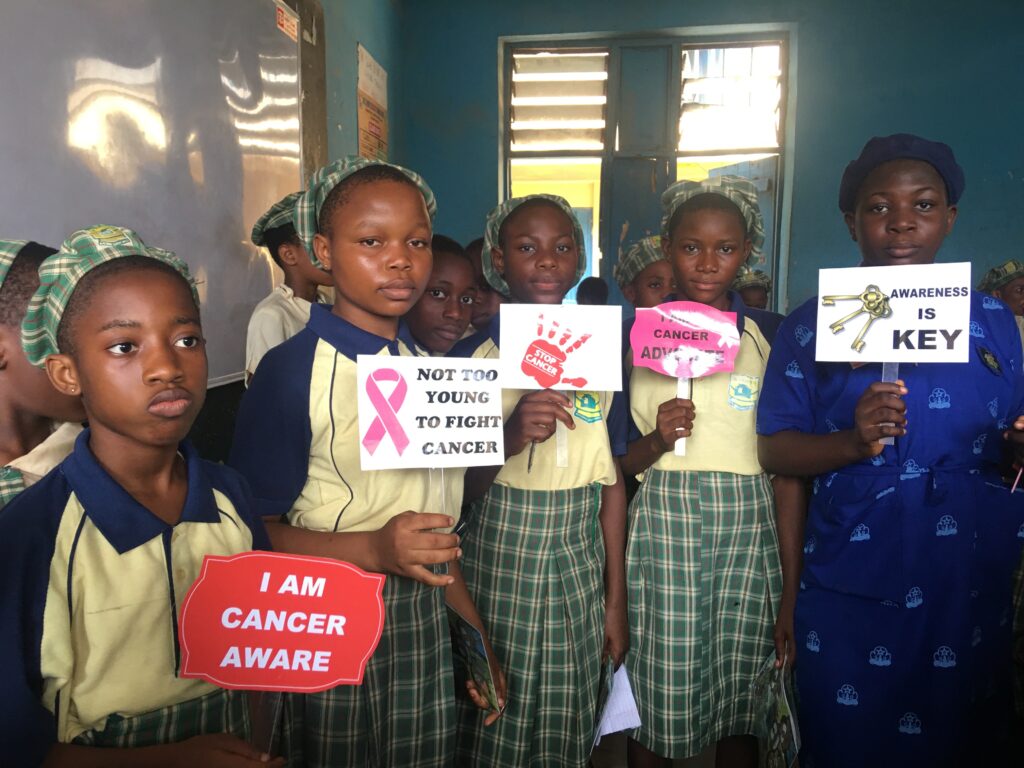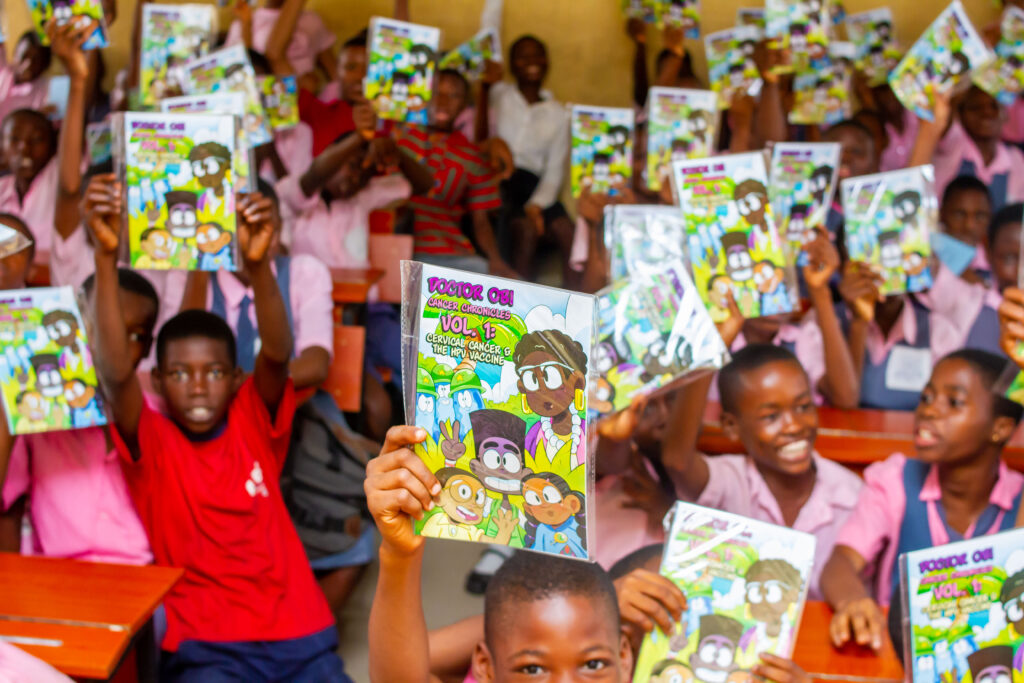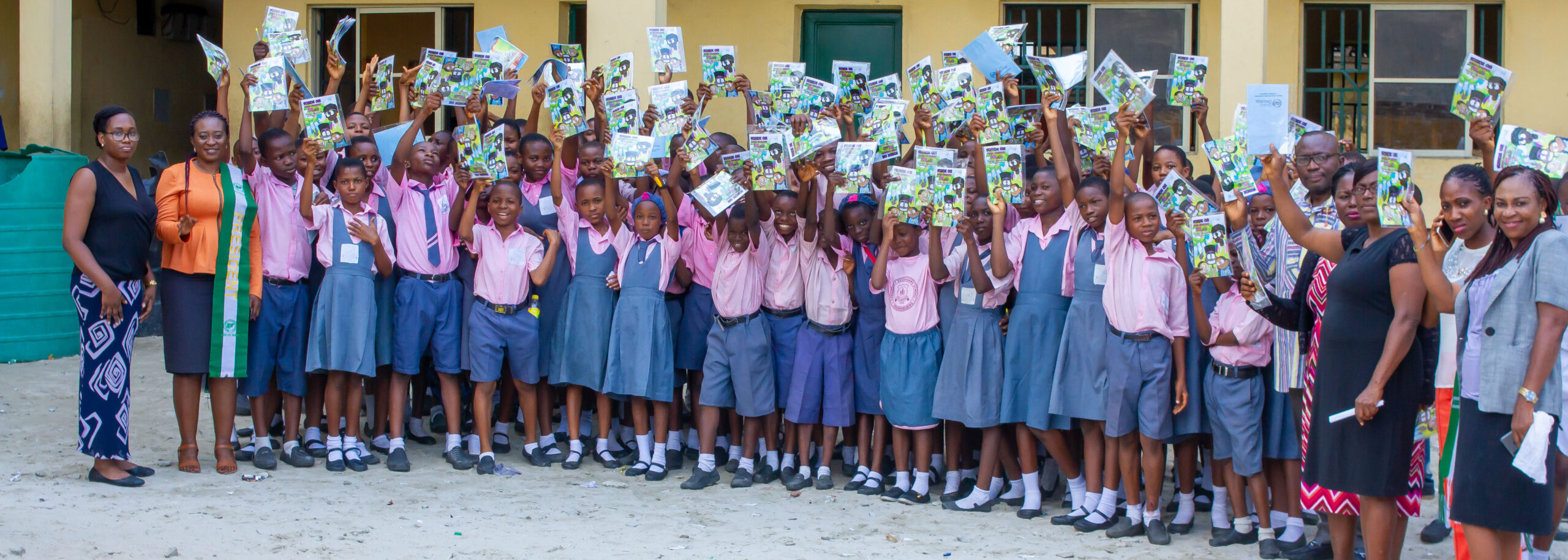Published: 03/13/2024
Stanford faculty and students join forces with Nigerian health leaders and global nonprofits to prevent a leading cause of cancer deaths
By Jamie Hansen, Communications Manager
In the U.S., vaccines and routine screenings have diminished cervical cancer’s impact on women’s health, cutting the mortality rate by over half and eliminating its status as a leading cause of cancer deaths in women. However, in many parts of the world, where access to these preventive measures is extremely limited, cervical cancer remains a major threat.
This trend is now changing on a massive scale in Nigeria, Africa’s most populous country. In 2023, Nigeria incorporated the vaccine for human papillomavirus (HPV), the primary cause of cervical cancer, into its routine immunization system. Officials aim to vaccinate 7.7 million girls aged 9-14 by the end of 2024, marking the largest single round of HPV vaccinations across Africa. Since the campaign began, nearly 5 million girls have already received the vaccine.
This milestone demonstrates the power of collaboration across countries, sectors, and disciplines to achieve a common goal, said Stanford Physician Ami S. Bhatt, MD, PhD. In her role as the co-founder of Global Oncology (GO), Bhatt has been supporting Nigerian cervical cancer prevention efforts since 2015 alongside global partners and Stanford colleagues and students. GO is a nonprofit organization dedicated to providing quality cancer care to underserved patients in many low-resource settings around the world and is co-led by UCSF Associate Professor of Medicine Franklin Huang, MD, PhD.
“Pushing a ball this big up a hill can seem like a Sisyphean task with many obstacles to overcome,” Bhatt said. “To get over that hump has required a lot of community engagement, governmental will and philanthropists, big and small. We’re very fortunate to be a small part of this.”
Striking health discrepancies galvanize action
In Nigeria, cervical cancer remains the second most common cause of cancer deaths among women aged 15-44, claiming about 8,000 lives annually. HPV, a virus transmitted through sex or skin-to-skin contact, causes 95% of all cervical cancer cases. Vaccinating girls against HPV before sexual activity is crucial for prevention.
A series of trips to Nigeria between 2015-18 underscored the stark contrast in cervical cancer outcomes for Bhatt and Stanford oncology colleagues, including then-director of the Stanford Cancer Institute Beverly Mitchell, MD, as well as Drs. Shruti Sheth, MD, Allison Kurian, MD, and Karl Lorenz, MD. These physicians and physician-researchers have worked closely with Bhatt on the Stanford-Nigeria collaboration.
“We got involved after learning about the need from our colleagues at the Clinton Health Access Initiative (CHAI) and the American Cancer Society. We witnessed people dying from a disease that is preventable in over 95% of cases,” said Bhatt, who is also a Stanford associate professor of medicine (hematology), genetics, and core leadership team member at the Stanford Center for Innovation in Global Health.
We got involved after learning about the need from our colleagues at the Clinton Health Access Initiative (CHAI) and the American Cancer Society. We witnessed people dying from a disease that is preventable in over 95% of cases.
Ami S. Bhatt, Md, Phd, Stanofrd Associate Professor of Medicine (hematology)
While Global Oncology had previously focused on providing cancer care in low-resource settings, including supporting the opening and operations of Belize’s only public cancer clinic, Bhatt and Huang were committed to responding to the most pressing needs their partners identified. They decided to expand their mission to prevention.
Building partnerships; overcoming obstacles

Many factors contribute to the high rates of cervical cancer in Nigeria, Bhatt said — chief among them the high cost and scarce availability of the vaccine. Other challenges included a lack of awareness of the cancers that threaten women’s health specifically and stigma against illnesses associated with sexual promiscuity, such as HPV.
Kikelomo Lambo, Associate Director leading the CHAI Nigeria Vaccination Program, attributed the success of Nigeria’s HPV vaccination efforts to a range of culturally sensitive strategies. These included: developing Nigeria-specific messaging and distributing it in local languages and employing gender-informed vaccination strategies, such as having women perform all vaccinations in areas where girls would need to remove their hijab to be vaccinated.
Nigeria also responded swiftly to anti-vaccination messages, debunking the myths in the same languages in which they were distributed. Finally, collaboration with nontraditional health partners such as the ministry of education, women’s affairs organizations, and religious groups helped ensure the campaigns’ success, Lambo said.
Bhatt, her Stanford colleagues, and Global Oncology supported many of these efforts. They teamed up with CHAI, the Nigerian Ministry of Health, and organizations such as the Nigerian nonprofit LISDEL (led by Senator Lanre Tejuosho) to build awareness about cervical cancer through educational campaigns and generate momentum for vaccination.
They also leveraged Global Oncology’s network to build partnerships and recruit supporters. For instance, a Nigerian-American, Patrick Domingo, helped coalesce a group of prominent Nigerian citizens, including former Nigerian President Olusegun Obasanjo, to act as ambassadors for the vaccine. The drive for a mass vaccination initiative experienced many challenges and setbacks over the years — including misinformation and the COVID-19 pandemic’s impact on vaccine uptake, national leadership changes, coordination challenges between the various stakeholders, and vaccine hesitancy among some religious groups and schools.
“It was critical that we be patient with how things were unfolding, and be willing to listen and work at it, even if it didn’t go in a straight direction all the time,” said Huang. “Our north star is to make sure that no woman dies of cervical cancer. We’ve always kept that goal in sight.”
Our north star is to make sure that no woman dies of cervical cancer. We’ve always kept that goal in sight.
Franklin Huang, Md, Phd, UCSF Associate Professor of Medicine
One key barrier remained the cost of purchasing millions of expensive vaccines in a country with a small per-capita healthcare budget. Collaborating with CHAI, Bhatt played a key role in integrating cervical cancer prevention guidance into Nigeria’s National Cancer Control Plan. They advised overcoming financial barriers by accessing the vaccine through the Global Alliance for Vaccines International (GAVI).
As a middle-income country, Nigeria wasn’t initially eligible for GAVI’s vaccine assistance. But once the plan for vaccine rollout was included in the country’s cancer control plan, Nigeria applied for an exception — which GAVI granted in early 2023. That same fall, Nigeria’s government led a five-day mass vaccination campaign in schools and communities across 16 states and the Federal Capital Territory. The one-dose vaccine regimen is provided free of charge by the Federal Ministry of Health, facilitated by the National Primary Health Care Development Agency, with support from GAVI, the Bill & Melinda Gates Foundation, the Vaccine Alliance, UN Children’s Fund (UNICEF), World Health Organization (WHO), and other partners.
Now, Nigeria is incorporating the HPV vaccine into the routine immunization schedule for these states and training healthcare workers on how to administer the vaccine and educate the community about its importance. The second phase is scheduled to begin this spring, covering Nigeria’s remaining 21 states. It will incorporate learnings from what worked well during phase one, while also seeking to strengthen the vaccine supply chain to ensure adequate stock and proper distribution to healthcare facilities, said Lambo.
Community engagement will be a core component of ongoing vaccination efforts, including raising awareness about the vaccine and dispelling myths.
A sustained effort to educate and empower

Those involved see the mass vaccination campaign as just one step in an ongoing effort to raise awareness about cervical cancer prevention in Nigeria. Many Nigerians are unaware of the risks associated with HPV and the threat of cervical cancer, partly due to the stigma surrounding cancers linked to sexually transmitted diseases.
“Many people in Nigeria haven’t even heard of HPV, so they can’t know the risk it carries. This is why starting with education and awareness is key,” said Edo Ighodaro, a second-year Stanford medical student from Nigeria and mentee of Bhatt.
In the summer of 2023, Ighodaro helped conduct education and outreach to girls about HPV and the vaccine using a comic book developed by Global Oncology to increase vaccine knowledge and uptake. Lambo said that partnerships with organizations like Global Oncology are critical to sensitizing communities to the vaccine and mobilizing their engagement.
“They were crucial to disseminating the right message and evidence-based information on cervical cancer,” she said. Global Oncology has also formed educational partnerships for a multimedia campaign explaining HPV, cervical cancer, and the vaccine.
This has included placing segments on Nigeria’s largest women’s radio station and commissioning a short film from Nigerian filmmakers to heighten awareness about cervical cancer, in collaboration with the media company Melanin Unscripted.
Collaborating with CHAI and the Nigerian Ministry of Education, they have already conducted an educational campaign in four states and plan to educate an additional 20,000 students in the coming months.
“Prioritizing school stakeholder engagement is key to successful school-based HPV vaccine campaigns,” said Lambo.
Prioritizing school stakeholder engagement is key to successful school-based HPV vaccine campaigns.
Kikelomo Lambo, Associate Director leading the CHAI Nigeria Vaccination Program
“Our goal is not to force vaccination on everyone, but rather to ensure that those who would like to receive the vaccine have access and that everyone has the necessary information to make informed decisions,” Bhatt emphasized.
Harnessing the power of Stanford’s resources
For Bhatt, Stanford’s contributions to this milestone exemplify the impactful ways in which the university’s expertise, research, and networks can be harnessed for positive global change.“It’s been truly fantastic to have colleagues with extensive experience in global health and outreach efforts offering guidance, support, access to their networks, and direct inputs,” she said. Bhatt said a broad array of Stanford Medicine leaders supported the work, including former Cancer Institute Director Beverly Mitchell and current director Steven Artandi, MD, PhD, Senior Associate Dean of Global Health and Director of the Stanford Center for Innovation in Global Health, Michele Barry, MD, and Associate Dean of Global Health Research Steve Luby, MD, to name just a few.
“Their support and guidance not only empowered us to do impactful work but also facilitated scholarly contributions in our emerging research on implementation science in cancer care and prevention,” she said.
Stanford students said their involvement in the initiative profoundly shaped their career plans and approach to global health.“I’ve always been interested in doing community service and outreach, and it’s been really valuable to me to learn from Ami and Franklin how to better serve the community by asking what the community needs first and then seeing what you can provide,” said Ricardo Mack, a PhD student in cancer biology who participates in a student group focused on racial and social justice in medicine.
Bhatt said she hopes others will be inspired to join or support the work of Global Oncology and its partners. It will take many volunteers and supporters to sustain the educational work necessary for preventing cervical cancer in the long run.
“It is critical that we continue to keep awareness high and combat misinformation,” Bhatt said. “Our job is just starting.”
Learn more about the campaign at cervicalcancerfree.org.
Cover photo credit: Courtesy of Global Oncology, via Ami Bhatt
